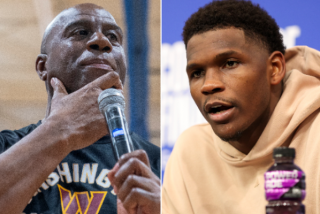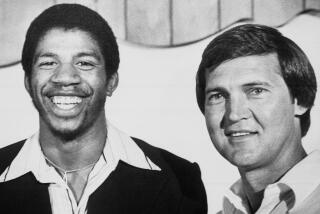Opponents Weigh the Risk of Playing Against Magic : Basketball: AIDS researchers say chances of transmitting disease minor. But Chaney says Johnson, voted to the All-Star team, shouldn’t play.
- Share via
On the day Magic Johnson was voted onto the Western Conference team for next month’s NBA All-Star game, leading AIDS researchers Thursday denounced comments that the former Laker guard poses a health risk on the basketball court.
Johnson, who said he wants to play in at least some games during this summer’s Olympic Games at Barcelona, has become embroiled in an international controversy, one that physicians say illustrates the ignorance surrounding AIDS.
“What we have to fight is an epidemic of fear,” said Andrew Pike, president of the Canadian Academy of Sports Medicine and chief medical officer of the Canadian Olympic basketball team.
After an Australian Olympic basketball team physician called Wednesday for a boycott of games against the United States because Johnson could spread the infection while playing, researchers tried to dispel some of the myths associated with AIDS.
“As a society, we have to decide what types of risks we will accept,” said Leonard H. Calabrese, director of the Section of Clinical Immunology at the Cleveland Clinic Foundation. “If Magic cannot play in the Olympics, then should we require HIV tests to get a YMCA membership? Should we be testing everyone who plays sports?
“You have to draw the line where the risks are real.”
Still, the fears are real. Some Australian players and at least one Canadian player, Leo Rautins, a former Philadelphia 76er, have expressed doubts about playing against Johnson. They believe there is a remote possibility that Johnson could transmit an HIV infection during a game because basketball is a physical sport in which competitors often suffer cuts.
Don Chaney, coach of the Houston Rockets, told the Houston Post Thursday that he is against Johnson’s participation.
“I feel he shouldn’t play,” Chaney said before a game against the Clippers. “If there’s a risk at all, I don’t feel that risk should be taken.”
The concern goes beyond on-court blood-to-blood transmissions, considered to be a one-in-a-million chance, according to Jacques Huguet, president of the medical council for the International Basketball Federation.
Privately, some NBA players also have expressed fears of facing Johnson, who received the second-highest vote total for guards behind Portland’s Clyde Drexler in the All-Star balloting. Tim Hardaway of the Golden State Warriors also was added to the team, giving the West 13 players instead of the usual 12 because Johnson is, in essence, retired from the NBA.
Johnson, a member of the National Commission on AIDS, has been on the Lakers’ injured-reserve list since announcing last November that he had contracted HIV, the virus that causes AIDS.
Because HIV is contracted through bodily fluids--most commonly by sexual intercourse or using an infected intravenous needle--athletes are worried about blood and sweat transmissions.
An NBA player, who asked not to be identified, voiced the concern of his colleagues when discussing researchers’ belief the risk is minuscule.
“That’s easy for you to say,” he said. “You’re not in those huddles with all that sweat.”
Addressing the fears is difficult, despite medical evidence that shows the risk to be inconsequential, said Dr. David Rogers, vice chairman of the National Commission on AIDS.
“It, to me, is kind of a sad witch hunt,” he said. “It’s a tragedy. It’s a senseless kind of fear.”
But such response is not unusual, he said.
“People with plagues have been vilified over the ages,” Rogers said.
The President’s AIDS commission has been forced to deal with such discriminating views for years. Rogers said public reaction to AIDS has made it difficult to offer a quick response to the epidemic.
Said the Cleveland Clinic Foundation’s Calabrese: “The same people who worry about getting sweat on them, go out and have unprotected sex.”
David Stern, NBA commissioner, said league medical advisers and Johnson’s physicians have assured the league that Johnson’s participation in the Feb. 9 All-Star game poses no threat to himself or to other players.
But David Ho, director of the Aaron Diamond AIDS Research Center at New York University, has said it is difficult to determine whether Johnson would be able to play in Barcelona. Ho, one of Johnson’s physicians, said Johnson has handled treatment from the antiviral drug AZT without suffering side effects. Yet, the highly toxic drug, or the infection itself, could prohibit Johnson from playing in August. His physicians will not know until later in the year.
Johnson and his agent, Lon Rosen, were in Hawaii and could not be reached for comment.
Jerry West, Laker general manager, said of the All-Star vote: “We’re delighted for Earvin. We think it is a great tribute to him.”
The Australian Consulate-General in Los Angeles issued a statement to distance itself from remarks attributed to Brian Sando, the senior medical director of the Australian basketball team, who called for a boycott against the United States.
“The Australian Olympic Committee has disassociated itself from these most unfortunate remarks,” said Tom Grealy, the consul for public affairs. “Australia looks forward to participating in the Barcelona Olympics, including, if we are good enough, playing the U.S. basketball team.”
Pipe, who is sending Canadian players information on AIDS, including a position statement from the World Health Organization, noted the irony of Johnson’s situation.
“Magic has sensitized a great number of the populace about AIDS, but now will be the victim of a prevailing level of community ignorance,” he said.
Calabrese said that while the emphasis is placed on AIDS, other infectious diseases are being ignored. He said basketball players competing internationally are at far greater risk of contracting hepatitis B, which is much easier to transmit.
“Educating people is not a simple task,” he said. “But so far, professional sports organizations have their heads in the sand.
“There has never been a single instance of HIV infection traced to sweat or saliva. (But) they’re saying, ‘Prove to me it (has) never happened.’ ”
Times staff writer Scott Howard-Cooper contributed to this story.
More to Read
Go beyond the scoreboard
Get the latest on L.A.'s teams in the daily Sports Report newsletter.
You may occasionally receive promotional content from the Los Angeles Times.






